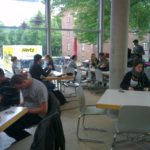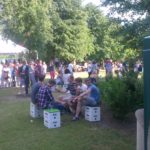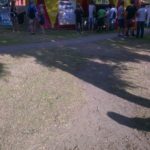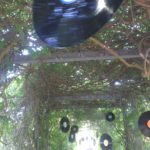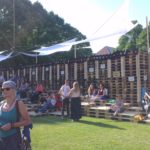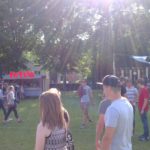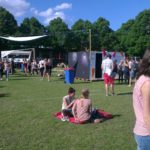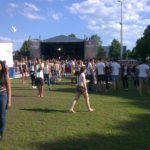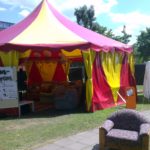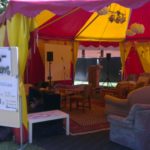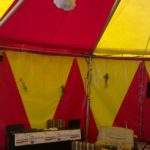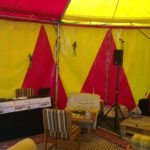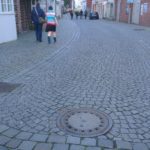Month: June 2014
Freies WLAN auf dem Lunatic Festival
Freies WLAN auf dem Lunatic Festival
Das mittlerweile elfte “Lunatic Festival” findet am 06.06 – 07.06.2014 in Lüneburg auf dem Campus der Universität statt. Der Verein Freifunk Lüneburg (i.G.) ist dieses Jahr mit dabei!
“Ziel unseres Vereins ist es, dass Menschen die Möglichkeit erhalten in Lüneburg und Umgebung freie Netzwerke aufzubauen, zu betreiben und sich darüber sozial und kulturell austauschen.
Ein Festival wie das lunatic ist dafür ein spannender, temporärer, experimenteller gesellschaftlicher Mikrokosmos. Wir wollen sehen, ob unsere Idee dort funktioniert.
Dazu werden wir an strategischen Stellen auf dem Campus-Gelände unsere privaten Freifunk-Geräte aufstellen, um das Gelände mit WLAN zu versorgen.
Wir wollen möglichst vielen Festival-TeilnehmerInnen einen kostenlosen und freien (d.h. unzensierten) Zugang zum Internet zur Verfügung stellen.”, so der erste Vorsitzende Arnim Wiezer.
“Weiterhin werden wir auf dem Gelände temporär “Freifunk”-Aufkleber anbringen, die die Festival Teilnehmer darüber informieren, dass sie Freifunk und das Internet nutzen können.
Freifunk Lüneburg wird auch auf einem der Festival Flyer vertreten sein und die NutzerInnen darauf hinweisen, dass sie sich unter freifunk-lueneburg.de genauer über Freifunk informieren können.” , sagt der zweite Vorsitzende Rüdiger Biernat.
“Wir bedanken uns herzlich bei der Leuphana Universität, die unser Freifunknetz an das Internet anbindet.”, so Claas Heinrich, Schatzmeister.
Von Londoner Netzaktivisten (http://resync.ug) wird das Freifunknetz zudem für einen kulturellen Workshop verwendet.
Per Smartphone, QR-Code und Freifunknetz können die Festivalgänger online ein Mashup aus Bilder, Sound und Videos erstellen und beobachten.
Weitere Infos hierzu:
http://freifunk.net
http://freifunk-lueneburg.de
http://resync.ug/wp/?page_id=17
Wir freuen uns auf das Lunatic Festival!
Analog III
reSync besucht analog III: “Verlagsbranche im Wandel”
“Haben die gedruckte Zeitung und das gedruckte Buch eine Zukunft? Wie gehen Verlage und Redaktionen mit dem digitalen Wandel um? Fragen, über die rund 60 Teilnehmer und Teilnehmerinnen aus der Region Niedersachsen im Rahmen der Veranstaltungsreihe ANALOG im Stadtarchiv Lüneburg diskutierten. Auf Einladung des Innovations-Inkubator Forschungsprojekts Hybrid Publishing Lab am Centre for Digital Cultures trafen sich Fachleute aus allen Bereichen der Medienbranche sowie interessierte Bürgerinnen und Bürger, um sich über die Digitalisierung der Medien auszutauschen, Erfahrungen zu teilen und den Blick für aktuelle Herausforderungen zu schärfen.” (CDC 2014)
Sieh auch video editing server & WikiTV
reSync @ Art meets radical openness
ReSync.UG visited the art meets radical openess festival, taking part in a discussion around mesh networking. The whole programme can be found here: http://www.radical-openness.org/programm/2014
VPN PICNIC: FROM HIVENETWORKS TO PIRATEBOX
Hivenetworks, started by Alexei Blinov and collaborators nearly 10 years ago, is an Open Source project that explores the new concepts of DIY network building, mesh architectures and ubiquitous computing. The aim is to take the DIY networking and publishing to the point where it becomes accessible to anyone with creative mind and basic knowledge of computing.
A PirateBox, designed in 2011 by David Darts, is a portable electronic device, often consisting of a router and a device for storing information, creating a wireless network that allows users who are connected to share files anonymously and locally. By definition, this device is disconnected from the Internet.
We are proposing an outdoor gathering, a picnic, where we’ll test both platforms and discuss history of the future of autonomous connecting, media (file) sharing, meshing and swarming tactics in urban environment.
Unitary Networking
Unitary Networking is a speculative approach to communications infrastructure, trying to establish a link between urban technology and communication technology and reflecting on the way they form networks of power.
In practice, the starting point of the project is an electronic messaging system running on a wireless mesh network, composed of both fixed and moving nodes. The messages propagate through the network when the devices come in contact with each other. It is a non-hierarchical network, where every node receives, relays and broadcasts messages. The users of the network can send or receive messages by using the webbrowser of their smartphone or computer. The messages can be received and sent at any time, but are only synchronized when other fixed or moving nodes are encountered.
We propose a three day workshop to install the prototype and discuss
together with the participants: The first day will explain the technologies involved and the various elements that we could play with. The participants will be able to make their own nodes for the network and we will think about how these nodes
could fit in the public space. On the second day we would like to go outside to set up the network in the streets and/or the public transport of Linz.
During the third day we would like to have a public presentation of the concept and progress, and open the use of the network to eventual experiments.
The project breaks down into a series of elements that will be part of the worksessions:
the installation of the devices that connect in the mesh network, which
will be flashed with free open-source software
the exploration of the urban space as a platform to deploy the network
the preparation of camouflaged devices as self-sufficient nodes, by
connecting it to solar panels or by parasiting vulnerable sources of energy
the construction of antennas to bridge longer distances
We count on public participation and interaction for making this proof of concept and the existing prototypes into a meaningful collective situation.
The workshop is open to public with different backgrounds and skills, as the different tasks in the project can be shared according to the capabilities and interests of the participants.
Options for Participants:
If the participants would like to create a node of their own they should
bring an Open-WRT compatible router. For a list of compatible hardware
see(http://wiki.openwrt.org/toh/start). We recommend the TP-Link
TL-MR3020 and TP-Link TL-WR703N for their small size and low power
requirements. We will bring between 5 and 10 routers ourselves, to be
used as nodes.
DATA UNION discussion group/worklab
Data Union is a project by The Analogue Group. It aims to create a viral union of data refugees, whose only possession is their data, as an experiment in everyday life, that is, as a laboratory of innovation for the autonomous use of data in local contexts globally networked.
These data unions will add value to contemporary movements of ecological, economic, racial, and gender equality in three specific ways:
1. To work with groups to understand contemporary regimes of copyright, and open data movements.
2. To develop a political analysis of the data-yielding activities of their communities, groups, and organisations.
3. To develop a collective, creative, and democratic response to the social, economic, and cultural implications of Big Data and to fully leverage the value of that data in the interests of democracy, equality, and justice. More here: http://dataunion.org.uk
We’d like to spread the word about Data Union beyond London where current activities are situated. An afternoon of discussion examining efficacy of everyday behavioural tactics relating to data, surveillance and autonomy to enable anonymity, data disruption and pollution, autonomous organisation, value negotiation.
If time allows, we propose to test the Open Mustard Seed (OMS) Framework, a project by researchers, developers and entrepreneurs, primarily from Harvard and MIT and the Boston Community that seems to bridge a gap to developing autonomy in data retention, monetisation and eventual strike.
The Open Mustard Seed project is an open-source framework for developing and deploying web apps in a secure, user-centric personal cloud.
The framework provides a stack of core technologies that work together to provide a high level of security and ease of use when sharing and collecting personal and environmental data, controlling web-enabled devices, and engaging with others to aggregate information and view the results of applied computation via protected services.
url:
http://dataunion.org.uk
http://idhypercubed.org/wiki

